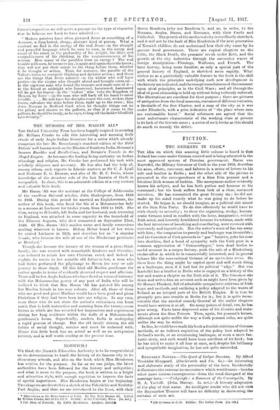NORWICHst We think the Norwich Education Authority is to be
congratulated on its determination to teach the history- of its famous city in its elementary schools, and also on the book which Miss Henderson has written for the purpose. So fa• as we can judge, the latest authorities have been followed for the history and antiquities ; and what is more to the purpose, the book is written in a bright and attractive style, with enough repetition to impress the facts of special importance. Miss Henderson begins at the beginning. Two chapters are devoted to a sketch of the Paleolithic and Neolithic East Anglia; and then we are introduced to the Iceni, with their
• OWrnntienr an the Ilfmanhaanns of India. Ey Mrs. Meer Hassan All. Edited In William Crooke, late of the I.C.S. Oxford at the University l'reAs. Ins. net.j I 2.10 Store of Emrich. Sty Edith Henderson, London: JarrOldi
Queen Boadicea (why not Boadicea 1), and so, in order, to the Romans, Angles, Danes, and Normans, with their Castle and Cathedral. The growth of the mediaeval city is excellently sketched, and it will not be the fault of Miss Henderson if the next generation of Norwich children do not understand how their city came by its present local government. There are capital ehapt era on the Gilds, the Black Death, the peasants' revolt under Kett, and the growth of the city industries through the successive waves of foreign immigration—Flemings, Walloons, and French. The later history, being more familiar, as only a special part of the general history of England, is sketched more rapidly. What strikes us as a particularly valuable feature in the book is the skill with which the principles underlying each new development in the history are indicated, and the conspicuous fairness of the comment upon rival principles, as in the Civil Wars ; and all through the ideal of good citizenship is held up without being tediously enforced. The illustrations are excellent for their purpose ; there arc pictures of antiquities from the local museum, costumes of different centuries, a facsimile of the first Charter, and a map of the city as it wan under Elizabeth, with a grim indication of " the place where men are custontablie burnt." Social reformers are agreed that the most unfortunate characteristic of the working class at present is its lack of the historic sense ; a series of such books as this should do much to remedy the defect.


























 Previous page
Previous page